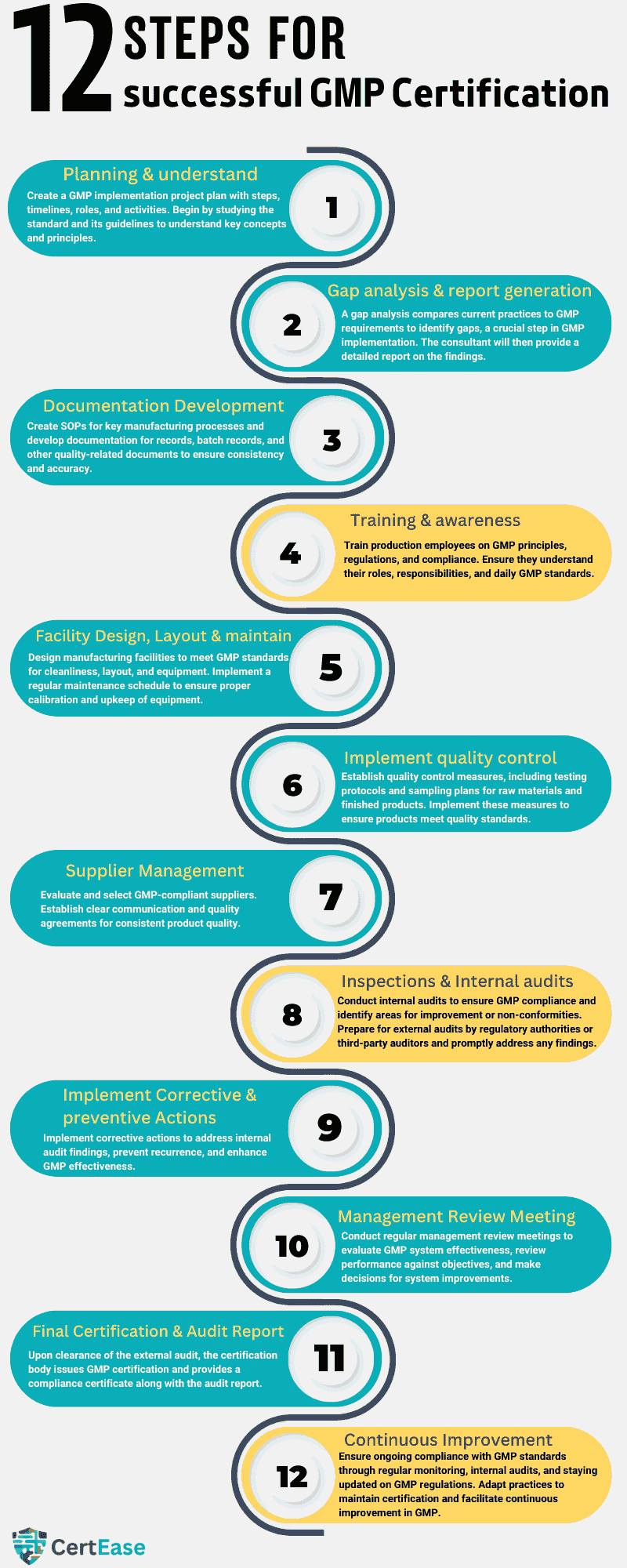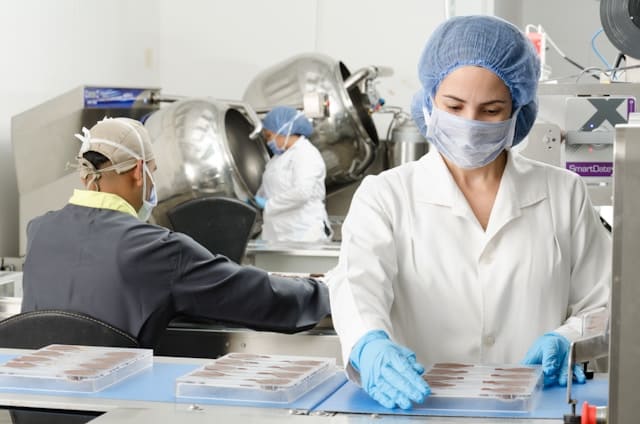GMP Certification in North Korea
CertEase offers GMP (Good Manufacturing Practices) Certification in North Korea to help organizations meet the rigorous requirements of quality and safety standards in manufacturing. Our services include a comprehensive review of processes, facilities, and documentation to ensure compliance with GMP guidelines. We provide tailored guidance to help you streamline your operations, minimize risks, and maintain high-quality standards across your production lifecycle. With CertEase, you can enhance consumer trust, access global markets, and demonstrate your commitment to delivering safe, reliable, and consistent products.
Looking For Certification?
Have queries?
Good Manufacturing Practices (GMP) certification in North Korea is a globally recognised standard that ensures the quality and safety of products in industries such as food, pharmaceuticals, and cosmetics, especially in cities like Pyongyang, Hamhung, Chongjin, Nampo, Wonsan, Sinuiju, Kaesong. By adhering to GMP certification requirements, businesses demonstrate their commitment to producing high-quality, consistent, and safe products. we will explore the meaning of GMP certification, its importance, and how businesses—whether large corporations or small enterprises—can achieve and maintain compliance.
What is GMP Certification in North Korea?
GMP certification, or Good Manufacturing Practices certification in North Korea, is a quality assurance system designed to ensure products are consistently produced and controlled according to strict standards. It encompasses everything from production processes and equipment to hygiene and employee training.
For food manufacturers and pharmaceutical companies in North Korea, GMP certification ensures their products meet regulatory requirements for safety and quality. This certification is particularly crucial in industries where product defects can directly impact consumer health and safety in North Korea.

Please fill out the details below, and one of our executives will be in touch with you shortly!
Benefits of GMP Certification in North Korea
Achieving GMP certification in North Korea offers several advantages:
- Enhances product safety and quality.
- Increases consumer trust and brand reputation.
- Reduces the risk of recalls and legal issues.
- Opens up opportunities to sell in regulated markets globally.
For food and pharmaceutical manufacturers in North Korea, these benefits are particularly crucial in maintaining a competitive edge.
How to Get GMP Certification in North Korea: A Step-by-Step Guide
Achieving GMP certification involves a structured process. Here is a step-by-step guide:
Understand GMP Certification Requirements in North Korea: Familiarize yourself with GMP standards relevant to your industry. GMP compliance vs certification requires knowing the guidelines and implementing them effectively.
Conduct a Gap Analysis: Identify areas where your current processes fall short of GMP requirements. A GMP certification checklist in North Korea can help streamline this step.
Develop and Implement GMP-Compliant Systems: Address gaps by updating processes, training staff, and maintaining proper documentation.
Hire GMP Certification Consultants: Experienced consultants like CertEase can guide you through the certification process, ensuring your readiness for the audit.
Prepare for the GMP Certification Audit: Conduct internal audits to identify and fix any lingering issues.
Pass the Certification Audit: An external certification body will assess your compliance and issue the GMP certification if all requirements are met.
Difference Between GMP and ISO Certification in North Korea
While both GMP and ISO certifications focus on quality management, they differ in their scope and focus.
- GMP certification is specific to industries like pharmaceuticals, food, and cosmetics, focusing on production processes and product safety.
- ISO certification, on the other hand, is broader, encompassing overall quality management systems applicable to various industries.
Businesses often seek both certifications to ensure comprehensive compliance and quality assurance.
GMP Certification for Food Manufacturers and Pharmaceutical Companies in North Korea
For food manufacturers in North Korea, GMP certification ensures proper hygiene, safe food handling practices, and compliance with global safety standards. Meanwhile, pharmaceutical companies in North Korea rely on GMP certification to ensure product consistency, efficacy, and safety.
Both industries must maintain rigorous processes and detailed records to meet GMP certification requirements in North Korea. This reduces risks of contamination or regulatory non-compliance, enhancing consumer confidence in their products.
GMP Certification Cost in North Korea
The cost of GMP certification in North Korea varies depending on the size and complexity of your business, the scope of certification, and the services of consultants. For small businesses, the initial investment might seem significant, but it pays off in improved product quality, increased consumer trust, and expanded market access.
How to Maintain GMP Certification Compliance in North Korea
Maintaining compliance is an ongoing process. Regular internal audits, employee training, and updates to processes are essential. Hiring GMP certification services in North Korea can ensure your business remains compliant as regulations evolve.
Best GMP Certification Consultants Near Me (North Korea)
Choosing the right GMP certification consultants like CertEase can significantly streamline the certification process. Our consultants with industry-specific experience, positive reviews, and a proven track record. A good consultant with Certease will guide you from initial compliance planning to passing the certification audit.
GMP certification in North Korea is a vital step for businesses aiming to ensure product safety, comply with regulations, and gain consumer trust. Whether you’re a food manufacturer, a pharmaceutical company, or a small business, especially in cities like Pyongyang, Hamhung, Chongjin, Nampo, Wonsan, Sinuiju, Kaesong, adhering to GMP standards enhances your brand reputation and positions your products for success in the market.
With the help of CertEase, a clear understanding of requirements, and a thorough preparation process, achieving and maintaining GMP compliance becomes a manageable and rewarding journey. Contact us today!
How CertEase Can Help?
CertEase’s team of expert consultants offers tailored solutions for businesses across the food supply chain. From initial gap analysis to full implementation and certification, we guide you through each step of the food safety certification process to ensure that your business is fully compliant and operationally efficient.

Protect Your Consumers and Business Today
Food safety is not just a legal requirement but a vital part of building a sustainable and trustworthy brand. Contact CertEase today to learn how we can help you achieve food safety excellence through our range of certification services.

10+
Years of Experience
Why Should You Choose Us?
You’re partnering with a company dedicated to making certification simple, efficient, and effective for your business.
- Expertise Across Industries – With deep knowledge of international standards like ISO, RoHS, CE Marking, and more, we provide tailored solutions for various sectors including healthcare, manufacturing, IT, and services.
- Comprehensive Support – From consultation and training to audits and certification, our end-to-end services ensure a smooth, hassle-free certification process.
- Global Reach – We serve clients worldwide, ensuring compliance with regional and international regulations, no matter where your business operates.
- Proven Track Record – Our team’s success in securing certifications for organizations across the globe speaks to our commitment to quality and client satisfaction.
- Customized Approach – Every business is unique, and we offer personalized services that cater to your specific certification needs, ensuring efficiency and optimal results.
- Ongoing Guidance – Our support doesn’t end with certification; we provide ongoing guidance to help maintain compliance and continuously improve your processes.
Email:
Contact@certease.com
Open Hours:
Mon-Sat: 9am - 6pm
